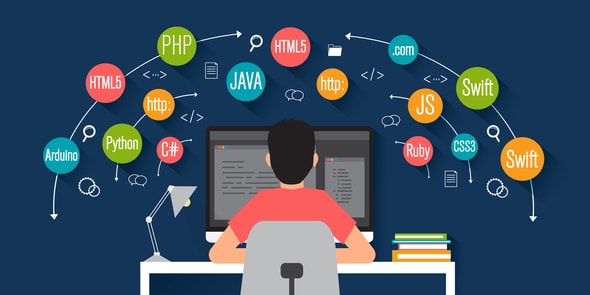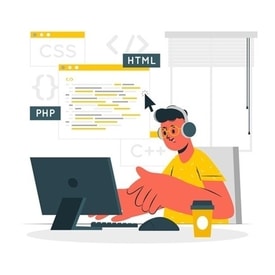Learning about Programming: The Complete Guide For Beginners
Software development and computer programming seem to be the most in-demand jobs in a variety of sectors. But learning to code could seem to be a daunting task. If you’re beginning from scratch, there’s a long road ahead, and some students get frustrated since they don’t know the process.
In this article, we discuss how you can learn java programming and other languages from the beginning. Hopefully, it will help you decide which are of expertise is right for you to study.
What Is Programming
It is indeed a collection of commands that enables a programmer to carry out specific activities and deliver the required output in response to legitimate inputs. A computer is a piece of technology that can save and interpret data.
A computer’s language is binary, which is a sophisticated collection of ones and zeroes. Programming has been the broader technique of creating a complicated machine code that follows human instructions.
The fundamental connection between user intervention and computer results is programming. It is the method through which a system determines when and how to analyze information.

The Programming Fields and Languages Used
Before beginning on a professional track and developing your own program, you must first choose a coding language. And, there have been a number of computer languages to pick from, over 700 to be exact.
Server-Side Enterprise Apps Development
If you are looking to join this programming field, you need to master it. Java along with Python remain arguably the most flexible programming languages available. It has been the most widely deployed computer language for creating applications, which are employed by huge corporations all over the globe.
Java is intended to become a flexibly linked computer language, which means that a Java program may operate on any system that supports Java. As a consequence, Java is known as the computer language that allows you to “code once and execute everywhere.”
Back-end Web Development
There are diverse careers in web development. Back-end programmers are concerned with things that allow the front-end to function. It’s behind the scenes. This position is always about understanding how a website or software operates, how fast it runs, and how much it interacts with networks. You need to start learning different programming languages including PHP, Python, and Ruby if you want to be a back-end web developer.
 Front-end Development
Front-end Development
Front-end development is concerned with whatever a viewer sees on their display. This includes UI, software troubleshooting, and code. This position is responsible for the overall feel, appearance, and layout of software or webpage. Front-end development involves learning TypeScript and JavaScript.
Full-Stack Developers can handle both the front-end and back-end. They are trained to build complete web applications from start to finish.
Data Science
They have the professional capabilities to tackle complicated issues – as well as the interest to figure out what issues have to be addressed. Acquiring and processing massive volumes of unmanageable information into a more usable style. Python, Java, Scala, and R are all languages that can be learned to become a Data Scientist.
Mobile App Development
The design of programs for portable devices that are created to make use of the devices’ particular functionality and technology is known as mobile app development. Conventional software engineering seems to have a lot of influence on the way the portable apps look and their major functions. Various issues may arise during this process and the developer may face such aspects as creating intuitive UI (to make the process of using app easy), cross-platfrom accessibility, data security, fast user-authentification. One may refer to a bulk of front-end and back-end development tools in the process of app creating and it’s crucial to have at least middle level of the following programming skills available and constantly improving them:
Java
If you’re looking for the main Java features – object-oriented programming that helps you to use standard programs and reuse your code is one of them. You may opt for it if you need multithreading (complicated projects with a variety of tasks that are performing simultaneously) and secure language for development. It can be used within a network and is one of the most widespread programming languages at the market. You can visit Codegym to learn java programming and explore everything from the basics to the core parts, including API, control flow in programs, encapsulations etc.
Kotlin
If you want to create server-side applications and be able to work with IntelliJ IDEA that is used in Java as well you may inspect the basics of Kotlin. Whether you’d like to develop some Android games, compile on Java Virtual Machine or even use with JavaScript you can do it both ways. Also, Kotlin is considered to be more lightweight and compile faster in comparison with other programming languages. Official Android support is a huge bonus too. More features are available at Kotlinlang.
Swift
Programming for IOS-based devices is impossible without Swift. It’s friendly for junior developers due to its clean syntax and powerful technology. Moreover, it provides extra safety cause memory is automatically managed and objects in Swift can’t be nil. So runtime crashes are eliminated this way. In case you’re interested in a modern cross-platform approach to mobile app development you may explore Swift pros and cons at Hackingwithswift.
Tips on Learning Programming Faster
It’s common knowledge that consistency is the key to successful learning. But there are some tips to speed up the process and make the most of it.
Code Daily
It makes no difference what degree of coding knowledge you have. It makes no difference if you are a newbie, moderate, or expert developer. Each programmer needs to do some type of coding exercise daily. It is not necessary for the code to be complicated.
You can learn to code for half an hour every day to improve your programming skills. Learning programming languages solely on weekends will not improve your skills enough to apply them in a conventional way. While taking a half-hour every day to code is beneficial, if you’re doing more, do so. .
Look for the Codes Made by Experienced Programmers
Checking the code of other programmers and finding the flaws in their programs can help you improve your programming concepts. There are several communities that you can join to check the programs of other developers. GitLab and Bitbucket are the highly recommended communities to join.
Moreover, you can join several forums like GitHub and Stack Overflow to interact with the programming community.
Use helpful blogs about programming
It’s always important to stay up to date with the latest coding news. Nowadays emerging trends in the app development industry can be easily tracked by following the leading blogs and websites in this niche. Do not underestimate them, because very often such resources publish important tips for programmers, with the help of which you can learn new tricks. You can also check blog for java developers to know more about Java programming and get guided in the world of coding.
Common Mistakes
It’s crucial to know the difference between good and poor practices while learning to code. Understanding what mistakes programmers make as well as how to prevent them might assist you to improve your coding skills. Here are some typical mistakes to avoid.
Ignoring the Java Libraries
Novice sometimes overlooks the diversity of Java libraries provided. Try searching for accessible libraries; some of them are refined over time. These might be monitoring libraries or networking libraries.
Piece of Advice
- You can save your time by using the given libraries.
- You can do a lot of activities with relative simplicity. It may be filling out a form, submitting a request, reviewing a document, or setting the calendar.
- Libraries give you access to a broad variety of web app features, leading to an application that is much less subject to problems.
Ignoring Debuggers
Debugging seems to be a valuable technique that may save you a lot of time and effort when addressing issues or even other people’s programming. You can master basic debugging techniques and methods, as well as how to identify and replicate bugs. Debugging is simple if you understand how to filter out parameters and pinpoint the problem.
Piece of Advice
- It promptly indicates an erroneous state. This enables early fault identification and simplifies the development life cycle trouble-free.
- It also gives the most important details about data structures and makes analysis simple.
- Debugging helps the programmer in eliminating unnecessary and unnecessary data.
Lack of Backups
Data backups are an important part of any disaster response strategy. Data in the workplace is subject to operating system failures. Setting up a data backup system seems to be critical to ensuring that your operations run smoothly.
Despite the fact that data backups require infrastructure and might require days to complete, the advantages of using one must exceed the risks of not possessing it. Malfunctions or file corruption, hacks, unintentional deletion, disasters, and more are all potential risks.
Piece of Advice
- Pick a solution that is beneficial for you and utilize it on a regular basis. You can start using Github or Gitlab for data backups.
Conclusion
The fundamental connection between user input and computer output is coding. It is the method through which a system determines when and how to analyze information. It is interesting to examine irrespective of one’s background. You’ll never realize whether you like something unless you give it a try. I’m glad you’ve taken the first step toward learning java programming and how to code. Good luck with your programming!
Learn how block programming can help develop computational thinking.





